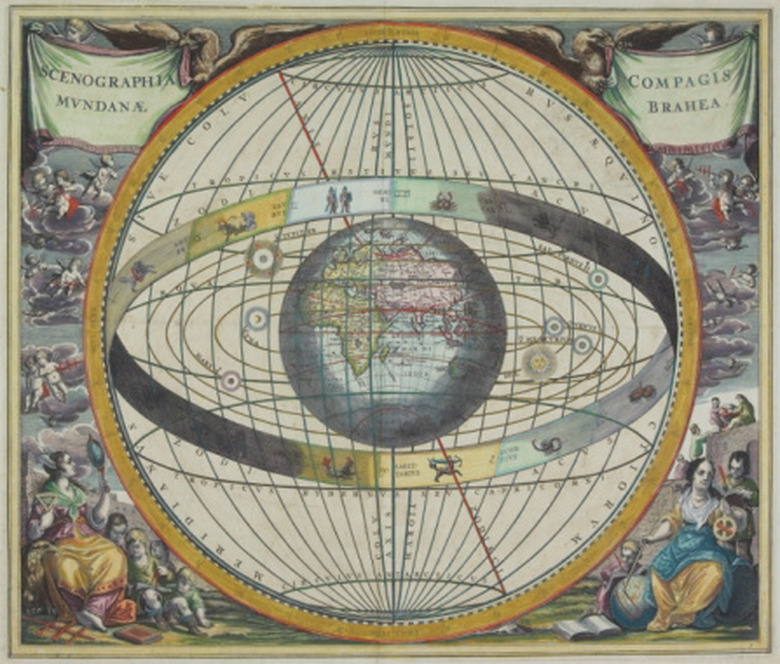What Types Of Zodiacs Are There Other Than Chinese?
The Chinese zodiac is most known for breaking down births by year, with signs beginning and ending according to the Chinese calendar where the new year typically begins in late January to early February. While the Chinese zodiac also classifies signs by month, day and hour of birth, it doesn't place the same emphasis on month that other zodiacs, such as Western and Indian, do.
Western Astrology
Western Astrology
In American, European and largely western-influenced countries the most commonly used zodiac is the Western astrological calendar, where twelve signs are divided fairly evenly across the year beginning on approximately the 21st of each month. There are twelve signs: Aries, Taurus, Gemini, Cancer, Leo, Virgo, Libra, Scorpio, Sagittarius, Capricorn, Aquarius and Pisces. All are named after star formations and the position of the sun during a person's time of birth. As with the Chinese zodiac, different characteristics are assigned to people based on the month and day of their birth. However, unlike with Chinese astrology, the year of birth is not considered in the Western zodiac.
Indian Astrology
Indian Astrology
Hindu, Jyotisa and Vedic systems of astrology have slight differences among them, but resemble each other enough that they are often labeled with the blanket term Indian Astrology. As with the Western zodiac, the Indian zodiac divides the year into twelve signs. These signs are closely tied to the signs used in Western astrology. For example, the Indian zodiac sign Mesa, which translates to "ram," is more or less the same as the Western sign Aries, also known as "the ram." Other signs include Mithuna or "twins," which corresponds to Gemini, and Dhanus or "bow," which corresponds to Sagittarius. Characteristics associated with Indian signs also correspond to those associated with their Western equivalent. The only difference between the two is the positioning of the star signs due to movement and location of the observer, as the positions of the stars differ by latitude.
Tropic Astrology
Tropic Astrology
A subset within both Western and Indian astronomy is the concept of a Tropic zodiac. Tropic zodiac signs are given a specific day in which they change over, typically the 21st of the month, regardless of when the star sign changes. The Tropic zodiac focuses less on the actual positioning of the sun at birth and more on a specifically defined date for each sign. This makes it easier to classify people born at that day instead of having to check the real position of celestial bodies on that specific day. Since Tropic astrology works on a standardized calendar instead of a year-by-year basis, most widely distributed horoscopes, such as those seen in newspaper and websites, use the Tropic zodiac instead of the Sidereal zodiac.
Sidereal Astrology
Sidereal Astrology
The counterpart to the Tropic zodiac is the Sidereal, which focuses on the day-to-day positioning of the sun at the time of birth rather than the dates assigned to the different signs. Sidereal signs change during the middle of the month, typically between the 13th and 16th, with a few exceptions due to year-by-year differences. Sidereal and Tropic astrologers continue to debate over which zodiac is more accurate.
In January 2011 further debate began as some astronomers proposed adding a 13th zodiac sign, Ophiuchus, to the zodiac between Scorpio and Sagittarius. Astronomers argue that changes in the rotation of the Earth necessitate altering the zodiac. The addition changes the entire zodiac by shortening the period of each sign. Ophiuchus also splinters the use of Sidereal zodiac into those who use the 12 signs and those who use 13. The differences between Tropic zodiac and these two versions of Sidereal zodiac are great enough that someone born between November 29 and December 15 could be a Scorpio, Sagittarius or Ophiuchus (or Vrscika or Dhanus) depending on the zodiac used.
References
- Bitstream: Meanings of the Zodiac Signs
- Manila Bulletin Publishing: 3 Major Types of Astrology to Help You Understand Your True Zodiac Sign
- My Birth Chart: Sun Signs
- "Daily Mail"; Unlucky for some: How hitherto unknown 13th sign of zodiac Ophiuchus could be why your stars never seem right; Daniel Bates; 2011
- Find Your Fate: Indian Astrology
Cite This Article
MLA
Kroll, Jess. "What Types Of Zodiacs Are There Other Than Chinese?" sciencing.com, https://www.sciencing.com/types-zodiacs-there-other-chinese-8457677/. 24 April 2017.
APA
Kroll, Jess. (2017, April 24). What Types Of Zodiacs Are There Other Than Chinese?. sciencing.com. Retrieved from https://www.sciencing.com/types-zodiacs-there-other-chinese-8457677/
Chicago
Kroll, Jess. What Types Of Zodiacs Are There Other Than Chinese? last modified March 24, 2022. https://www.sciencing.com/types-zodiacs-there-other-chinese-8457677/
